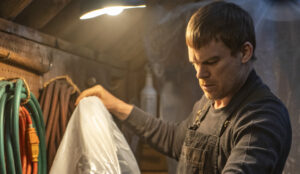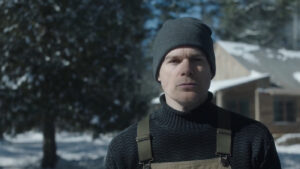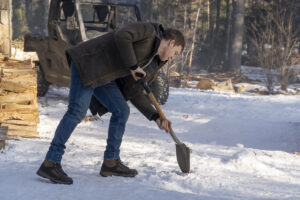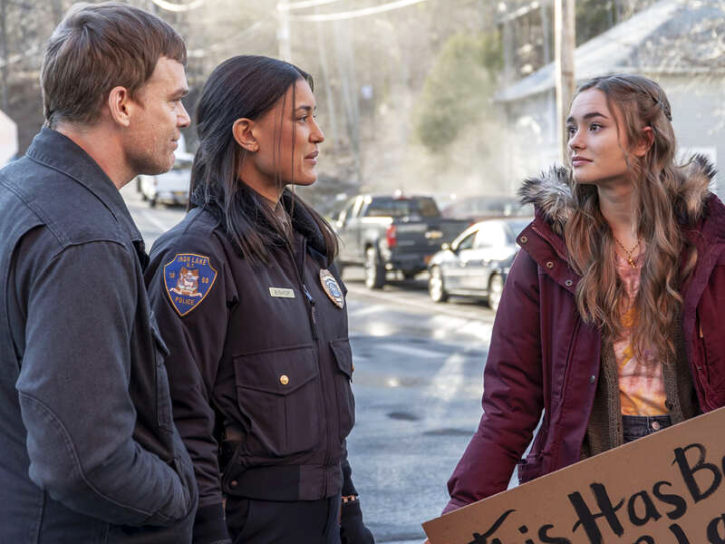TV Interview!

Interview with Michael C. Hall, Jennifer Carpenter, Julia Jones, Clyde Phillips, Scott Reynolds and Marcos Siega of “Dexter: New Blood” on Showtime by Suzanne 8/24/21
This was a great panel for the TCA, and I was so happy to be able to ask questions for this show that I love. I’m very grateful that they’re bringing it back for at least one more season because it’s one of my favorite shows.
SHOWTIME SUMMER 2021 TCA VIRTUAL PRESS TOUR
DEXTER: NEW BLOOD
Michael C. Hall (he/him), Executive Producer/ “Dexter”
Clyde Phillips (he/him), Showrunner/Executive Producer
Scott Reynolds (he/him), Executive Producer
Marcos Siega (he/him), Director/Executive Producer
Julia Jones (she/her), “Angela”
Jennifer Carpenter (she/her), “Deb”
Virtual via Zoom August 24, 2021
Eight years after he left our air, Michael C. Hall is back as Dexter Morgan and reuniting with original showrunner Clyde Phillips and an incredible ensemble in a 10—episode special event series “Dexter: New Blood.”
Please note that there are spoilers here for the show!
There were many journalists in this panel, but I was very glad that, at least, I was able to ask a couple of questions. I asked the show’s creator and showrunner, Clyde Phillips about why they didn’t bring back most of the cast from the original show. He answered that several are returning. At this point, I did know that Jennifer Carpenter was returning as Deb. I knew that James Remar (Harry) was not, so I was hoping he would mention him, but he didn’t. He complained that it was difficult to keep spoilers from coming out nowadays. He said that John Lithgow, who recently won an Emmy, mentioned that it was great to work again with him, Hall and Carpenter, which let the cat out of the bag that both he and Carpenter would be on the new series (which they hadn’t planned to announce). He also said that there may be more surprises like that as well.
Their decisions about whom to have return was based on these questions: “What’s the best for the story? What’s the best for Dexter’s character? What’s the best for the whole season?” And in answering those questions, that decided who was coming back.
I asked Michael C. Hall (Dexter) a rather silly question about whether it was cold when he was filming – because his character complains a bit about being cold (since he’s from Miami in the original series, but now he’s up in the northeast). I wanted to know if he was cold in real life as well. He said that at least in one instance, where Dexter said he was cold, it was about 80 degrees. Otherwise, it did get pretty cold at some points. He didn’t want to complain too much about the cold, but there were a few times when it was “about 2 degrees.” However, he pointed out, “I mean, I relished it. I kind of loved it. It was — I liked, actually, being cold, as opposed to acting like it was cold when it was 80 degrees. It was a lot easier to just be cold.”
The next question asked whether we see in the show where Dexter has been the past decade. Hall answered that we meet him in the town of Iron Lake, where he’s been able to carve out somewhat of a normal life for himself. Hall thinks he was “nomadic” before that and “he’s been probably skirting along the edge of the western to northern border of the country.”
 The next question asked why they brought back Harrison and if that has anything to do with the subtitle “New Blood.” Phillips replied that the theme of the show is “fathers and sons.” He acknowledge that Harrison thought Dexter was dead, so now he has a lot of resentment when he’s found out that he’s alive. “And Dexter has a lot of work to do to win his son back and prove that he’s a good father. And we think we get there.”
The next question asked why they brought back Harrison and if that has anything to do with the subtitle “New Blood.” Phillips replied that the theme of the show is “fathers and sons.” He acknowledge that Harrison thought Dexter was dead, so now he has a lot of resentment when he’s found out that he’s alive. “And Dexter has a lot of work to do to win his son back and prove that he’s a good father. And we think we get there.”
Scott Reynolds added that the other theme of the season is “the sins of the fathers” and how they’re passed on to the children. This gave them a lot to explore.
Phillips admitted that the subtitle “New Blood” was chosen by the network, but it does allude to the fact that it’s a new “Dexter,” not the 9th season, and there is blood.
The next journalist asked about the previous finale, where Dexter was last seen as a lumberjack. Now we see him with an outdoor lifestyle, in a small town, “making friends with Bambi.” He/she wondered if the finale made them commit to this change in lifestyle for Dexter.
Hall disagrees with the assumption that the place he’s in is very similar to where he was left at the end of the series. They considered where to have him be when the show begins. He points out that Iron Lake is very different because it has a lot of trees. “But he’s in, geographically, quite a different place, and certainly has come a long way, just in terms of the time that’s passed. But locating himself … within a context that is pretty much empathetical to everything that defined it from the Miami standpoint was something that felt right.”
Phillips put in his two cents that having Dexter in a small town means he has a lot fewer people around to tempt him to go back to killing. Although people will die, he is a “new Dexter … struggling with the urge, struggling with his dark passenger, struggling with the fact that he was born in blood, and finally gives in to that struggle.” The whole reason he’s in a small town is so that every person he passes in town could be a potential victim. “‘He’s really got to do the work to find who deserves for him to take a stab at it, as we would say.”
Jennifer Carpenter (Deb) was asked a question about how she approaches the character she’s playing now in the new series (which is not really Deb, but Dexter’s conscience), which doesn’t seem to curse as much as the original Deb did, and how does she compare how she played her, then and now.
Carpenter described herself as “a link or an echo or an inconvenient truth for Dexter.” She liked playing this new version, where she gets to return do all these things to Dexter, to “haunt… punish… caretake… provoke and love Dexter.” When acting, she concentrated on where the character of Dexter was emotionally. Phillips added that Deb does swear more as the episodes continue. Carpenter agreed, advising us to “be patient.”
Hall was asked if he agreed with some Showtime executives that had hinted that they “hadn’t done Dexter justice with the ending” and whether they felt the need to come back and revisit it.
Hall answered that he thinks that the ending of the original show has much to do with why they’re bringing back the character and the show. Viewers were shocked and confused by the earlier ending, so that’s why they will want to see the more satisfying show they’re doing now. He regrets that people didn’t get closure and that they didn’t hear from Dexter because he didn’t say anything in the end. There was no voice-over, like in most of the series. He felt like audiences were left with “a sense of suspended animation.” He feels they were motivated to answer what really happened to Dexter in a definitive way.
Hall was asked what the stag in the first episode meant to him because he/she loved all of the imagery, which seemed to speak to the point that the audience wants to see the good in Dexter and that he does killing “for the right reasons, which of course is ridiculous.” He/she felt that the scene was a strong “tipping point.”
Hall was happy to hear that he/she responded to the stag scenes. Dexter’s ritual of tracking and not killing it “represents some aspiration to goodness, to purity, one that he wants to cultivate and wants to come closer and closer to, and wants to figuratively and literally touch, if he’s able. It’s also a way to push himself to physical exhaustion and to maybe exercise the muscle of restraint and cultivate his restraint. That’s his new sense of power, at least when we meet him.” He added that it helped him manage his Dark Passenger impulses, like therapy. He compared it to taking methadone as a substitute for heroin. Also, he aspires to purity, such as the relationship he had with Deb, and that’s part of his abstinence. He’s doing penance for his past when we see him in the new series.
Julia Jones (Angela) said she believes that the buck is a symbol of Dexter’s humanity. She thinks that he has more humanity than he did in the original series (which she’s just been watching and hadn’t before).
Phillips agreed that Dexter is trying to cultivate and protect his connection with Julia and the other people in the town as well as with nature and the natural world. He added, “And the connection between Dexter and the white buck is primal, and there’s a lot about Dexter that is primal.”
Carpenter also spoke up to say that what happens with the buck is a reminder “that everything beautiful that Dexter touches, it always ended up disfigured or deformed, in spite of himself.”
Phillips was asked about any “unfinished business” he felt there was with the show over the years and that with the phrase “coming back,” were they able to deal with the new ideas he might have come up with. Phillips described the situation for us, that he and Hall had conversations over the years about bringing the show back, but Hall was always busy with other things. The timing wasn’t right. He said, “And it had to be — it had to be right for Michael, Michael’s psyche, Mike’s character, Michael as an actor, as a man.” Then they finally found a way to make everything work. As of this interview, they’re editing the show, which he thinks is “spectacular.”
Hall was asked whether he though, over the years, about what Dexter could do now – things that hadn’t been done in the earlier series. Hall agreed that there were many things that floated through his brain. He agreed that there was “unfinished business” and “I think from the day the show ended until we started, and perhaps even finished principal photography on this revisitation, it’s been percolating. It’s been something that’s been a conscious, maybe sometimes unconscious preoccupation.”
Jones was asked about her character, Angela, who’s “the first Native American sheriff in town.” He/she hopes that she’s the one that ends up capturing Dexter. He/she asked her to talk about representation and diversity in the show, and hoping that she’s “more than just Dexter’s girlfriend.” Jones agree that she is. She has a teen-aged daughter, “she’s the chief of police in a small town in upstate New York. She has a lot going on. She’s a very multi—faceted character. She’s passionate; she’s compassionate; she’s strong—willed; she’s flawed. And I think that’s probably my favorite part about her, is just playing with all of those layers and with the flaws, and with what she does with the flaws. And of course, yes, you know, the representation is huge. It’s something that was really important to me when I first started reading the scripts, and it was something we’ve talked a lot about. And there are a number of really wonderful Native actors who are also in it. And this is just a very exciting time for the Native community in the film industry. There are a lot of Native creators and filmmakers who are making things, and they’re getting made and they’re getting seen. And I think that the representation on this show is a part of that movement, and that feels really good.”
A great question was asked about whether there might be a spinoff of “Dexter: New Blood” (if this one does well), with Harrison following in Dexter’s footsteps. Phillip replied that they’re not really thinking about the future yet, and that it would be the decision of the network.
They were asked about how they balanced continuing the story from the original show with making it so that new viewers would be able to watch and enjoy it. Phillips pointed out that they do tell us that ten years have passed. They didn’t want to just tell us to forget the ending of the original show. They wanted to give the audience credit for being smart enough to understand the direction of the new show. They tell us where he lives and that he has no real connection to his past in Miami. From the first moment of the first episode, you can see where Dexter is and that he’s no longer in Miami or any other place, and that he’s no longer a lumberjack.
Phillips continued, “This is a completely, wholly new environment. And part of that, besides all the story—telling and all, is the design that Marcos put on the show. He made this look like a feature. I don’t want to go too deep into the weeds about it, but the aspect ratio, this is much more like a movie the whole time, so that the audience is automatically sitting forward. They can’t relax and say, ‘Ah, this is a nice, warm cozy pillow.’ Instead, “This is something new. I’ve got to pay attention.'”
I do have to disagree with what he says here a little bit because I don’t think most people can tell the difference between where he was at the end (in Oregon) and where he is now (in upstate New York). They both look cold and dreary, and they both have lots of trees).
The next question was a little bit wordy, so I had trouble figuring out what he/she was asking. I gather he/she was asking whether this is the “definitive ending” of Dexter or not, and whether Phillips would have done the original one differently. He also asked Hall whether he would play Dexter again after this season.
Phillips demurred, saying they can’t talk about the ending of the show. He said that “what we are happy to talk about is the process, how this came to be, what we did. We just got done shooting for 119 days in a row, which I think is — we shot it in Massachusetts, to be New York. And we did it in a time of COVID. And it was an extraordinary undertaking. It was the hardest I think any of us have ever worked, or that all of us has ever worked. And we’re really proud of what we set out to do, and we’re really proud of the fact that we accomplished what we set out to do. So, I’m avoiding the second half of your question on purpose.” He did say that just because he might have ended “Dexter” differently (season 8), that doesn’t mean it would have ended in that way. It’s really up to the network and their responsibility about how the show ended and whether Dexter would die or not. He’s grateful that they decided not to kill him (and implied that he would have).
Hall replied that he couldn’t answer the question about whether he would return as Dexter or not because it might imply too much about the ending of the show (too many spoilers, in other words). He does hope that people who watch the show will have “a satisfying experience for people who watched it originally and are curious about what happened to him. I hope it does — certainly, I hope it does provide some definitive answers that aren’t primarily just mystifying to people.”
The next reporter points out that because of all the true crime shows and podcasts, people may be a little bit more desensitized to murder (than they were when “Dexter” first aired). He/she wondered if that affected their thinking about this season and the character and whether we’d ever hear Dexter in a murder podcast.
 Phillips pointed out that Jamie Chung plays a “true—crime murder podcaster who is “introduced in the third episode”” and plays a major role with Julia’s character (Angela) … working her way through all of these crimes that have been committed. So, we are paying attention to it.” He and Hall have discussed this very thing, that the audience has changed, and that there are many young people that will watch now (that were too young to watch before). He also mentioned that the way they deal with murder in European TV as well here has changed. “And we — the audience has changed. And we want to acknowledge all of that in what we’re doing.”
Phillips pointed out that Jamie Chung plays a “true—crime murder podcaster who is “introduced in the third episode”” and plays a major role with Julia’s character (Angela) … working her way through all of these crimes that have been committed. So, we are paying attention to it.” He and Hall have discussed this very thing, that the audience has changed, and that there are many young people that will watch now (that were too young to watch before). He also mentioned that the way they deal with murder in European TV as well here has changed. “And we — the audience has changed. And we want to acknowledge all of that in what we’re doing.”
Reynolds added that they changed the previous “Dexter” format. Before, they had 8-10 villains per season that Dexter stalks, hunts, wraps in plastic and kills. This season, things are more personal because it’s about Harrison and “family life. It’s about, you know, a father who is a serial killer, and the effect that has on everybody around him.”
The next journalist asked Hall and Carpenters about getting back into the character, whether it was difficult or more natural, and whether they went back to watch the original series, in order to prepare for this one.
Hall replied that he didn’t go back and watch. He felt that the idea of returning as Dexter “was somewhat daunting, the idea that this person who you said goodbye to had been in some parallel realm been living a life for all these years, and they were going to turn the camera back on, and you needed to embody him once they did. It was a little daunting and scary, and I didn’t know how it would feel. But, you know, as Clyde said, we shot like 119 days, 52 locations. I mean, once we started, we were off and running, and there really wasn’t that much time to check in and sort of assess how it felt, because there was so much to be done. But he was still there, you know. I spent a great deal of time with and as him and felt there were things that are maybe sort of idiosyncratic to the way he behaves, the way he talks, the way he moves. Obviously, he looks a lot like me, but he is a fictional character. But that would manifest themselves or would happen seemingly spontaneously. And it was kind of eerie to have that experience. Like ‘Oh, there he is. I guess I’ll just get out of way and let him be.’ So yeah, it was scary, but once we started, he was there to be found.”
Carpenter considered the question, saying “My heart is actually racing considering that question. And it was sort of unclear to me exactly what was being asked of me from the start. And I didn’t really feel like I wanted to go back and sort of take score. I didn’t feel I was — I sort of feel that that had a different ending than the show had. So, I decided my work was to go to the bottom of the ocean and collect her and see if she wanted to be a witness to watching an unmedicated, decoded, unpunished, unchecked serial killer experience himself. And I wanted to say, ‘Yes,’ because I think Mike is one of the greatest actors I’ve ever worked with, and he — I wanted to massage Deb’s scar tissue. I wanted to — I would show up any day of the week to sort of relieve her pain. In my sense, most of them — of course, they’re all exclusively with him. And I didn’t realize what a help he would be in that repair for her. It was cosmically profound going back.”
Another person asked about Deb representing the dark passenger – what this means for Harry, and how is she different.
 Carpenter answered, ” I sort of, of course, love the concept of the dark passenger. And I feel like, you know, being uninvited inside Dexter’s psyche, I feel like sometimes the dark passenger is the passenger directly behind the wheel, and it was an opportunity not to be an angel or a devil on his shoulder, but to jerk the wheel to the right and the left against Dexter’s will. And to manipulate him, to navigate him, to abuse him, to save him. I feel like it was — it was something entirely different than some sort of ghost entity.”
Carpenter answered, ” I sort of, of course, love the concept of the dark passenger. And I feel like, you know, being uninvited inside Dexter’s psyche, I feel like sometimes the dark passenger is the passenger directly behind the wheel, and it was an opportunity not to be an angel or a devil on his shoulder, but to jerk the wheel to the right and the left against Dexter’s will. And to manipulate him, to navigate him, to abuse him, to save him. I feel like it was — it was something entirely different than some sort of ghost entity.”
Hall agreed that Harry was more like his guiding light, with a consistent P.O.V., but Deb, “in the context of this world, was coming from everywhere. And I think, you know, in as much as she’s an internalized character for Dexter, I think it represents just how far he’s come or how far he’s fallen, or how much he is, relatively speaking, to the time when we first meet, him internally reeling and without a compass, in as much as he’d like to have one.” He was excited to have Carpenter playing because he knew she would be able to “shape shift and come at me and at Dexter from so many different places, turning on a dime. And of course, she did. And it was really fun to crack open our sense of his internal landscape. Because it’s much more in a way like pyrotechnic and crazy than it used to be, I think.”
Phillips and Reynolds were asked if Deb was just replacing Harry. Phillips points out that what Harry did to Dexter, as Deb says in the show, “could well be considered child abuse. To take your son who you rescued, their being born in blood and who is out killing dogs in the neighborhood, and then channeling him to use his force for good and go out and kill bad people is not the healthiest psychiatric situation to be in. And I think Deb represents more than the dark passenger. She represents a corner of Dexter’s mind that we all have in our own heads that says, ‘Well, wait a minute. If you do this, then here are the consequences.’ Then Dexter has to decide whether to do it or not. He points out some key moments from the first episode. ” If you noticed at the very beginning of the show when we first introduced Deb’s character, it’s very quiet. It’s very still. They’re talking about, ‘Well, you’re the one who chose this fucking place.’ And then they’re sitting at the table and Jen has her head down, and Dexter almost touches her, but he can’t, because she’s part of him.” Also, he mentioned that Hall had come up with the idea during the pilot’s development that “their relationship should feel lived in. We are touching Dexter in two weeks — the show takes place over about two weeks — in two weeks of his life. So, this relationship has gone on for years, and we just happen to be privileged enough to get a glimpse into it.”
Another reporter pointed out that Hall “made reference to Dexter being there to be found again” and that in the first episode, there are long scenes that give him a lot to do. He asked if they were helpful to him in finding his way in this new show. Hall replied that he liked how we first see him by himself, “not interacting with anyone other than this wild animal and this internalized manifestation of his dead sister. ” It shows us “how isolated he is from the world” and tells us how we see him in that new world. He “really relished as an actor.” He hopes that viewers watching that new series feel that and how Dexter tries to be in the world, but he’s not quite in it. He finished with “allowing the character and the pace of it to breathe a bit at the beginning was” something he enjoyed and was important for the story.
A new person asked what qualities they looked for when casting Harrison (Dexter’s son).
Phillips related that they wanted to first “believe that he could indeed be Dexter’s son.” He said that they shot the show out of order. They first shot the winter stuff in February (when Dexter was so alone). The end of the show, which takes place at a bus station, was “shot the third week in July. It was 80 degrees that night. And we all — we needed a young actor adept enough to be able to go with that the way an experienced actor like Michael could go with that. And Jack [Alcott], in his readings, we gave him those scenes to read as we were casting, and he just nailed it. There’s an enthusiasm about him, a cultist shift about him, and a great depth of character to his character. And he’s a great kid.”
The same reporter also asked about the new titles, since the original ones were “iconic.” How would they “”reflect its own unique identity, but also sort of live up to the original?” Good question! We haven’t yet seen the new titles because when we watched the pilot, they hadn’t finished them yet. Phillips acknowledge that: “we haven’t really completely closed the deal with what the new titles are. But it will not resemble the cheekiness of what we had before, the jaunting of the irony of what we had before. Again, it’s all part of, this is a different show, while they were touched on, as Marco said, to the old show. But the viewer should expect that the title sequence, if there is even a sequence, but the titleage will be very different from what they’ve seen before.”
Next, Hall was asked what made him decide that it was the right time to come back to the series and character.
It was a funny moment in the panel because he/she prefaced the question with “if this isn’t too personal…” so he replied, “That’s too personal — I’m just kidding. No, I’m just kidding.”
He continued seriously that “it was a combination of things. I think enough time had passed that there were certain story—telling possibilities that hadn’t really been in play earlier on. So that was a part of it. And it also had to do with the fact that we were kind of getting the band back together. I mean, that Clyde was going to do the show, that Scott was going to do the show, that Marcos was going to be our sort of main director and sort of a producing director in terms of creating a visual language for the show, that Jennifer was available to come back. It was — there were many moving parts, all of which came together. But I think, like I said, a big part of it was that enough time had passed to — well, frankly, for Harrison to be of a certain age to be plausibly someone who has the wherewithal to track down his father.”
They were asked whether Deb will be funny again, like she was in the older series. Phillip replied that she is. He told us that “”In fact, there’s a great scene I just watched earlier on where Dexter is reminiscing with Harrison about ‘odd Deb’ and how outrageous she was. And they end up having a little back and forth, quoting some of her more outrageous statements. So yes, it’s part of the show. Humor is a big part of the show.”
Carpenter joked that she was “Funny looking, for sure. ” She felt that the last scene she thought was “pretty fun,” but she doesn’t think she should give it away.
Hall and Jennifer were asked if they ever thought, back in 2006, when “Dexter” first began, that the show “”really was on the cutting edge of what would become like a real premium TV revolution. And you guys were at the forefront of that. Do you take time occasionally to stop and smell the roses and look around” and think about other TV characters that have come about because of their show. Hall admits he wouldn’t have thought about 2021 way back then. He’s “just incredibly grateful that I happened to catch some sort of momentum or catch some sort of waves acting—wise and jobwise that coincided with the ocean really churning in the way that it continued to. It was — I remember that first season, it felt like we were in on a secret. And I think we all felt like we — it would be a secret worth sharing. And I certainly had hopes that the show would develop some sort of niche cult following as far as the breadth and depth of the audience that we ultimately attracted. I had no expectation that that would have happened. But I’m glad it did.”
Carpenter joked that she was grateful her car broke down after the audition and not before. She went on in a more serious vein to say that ” this role has been one of the great privileges of my life. Not only did I learn so much as an actress, but there was such a massive give and take between myself and Debra, and Debra — and, you know, one of the greatest pleasures I think was going to the Comic-Cons, where there would just be roomfuls of rabid fans. And it was sort like you would take your empty tank from having just shot a season and they would just fill it up with like the cleanest gasoline so that you could go and burn through another season.
And you knew there was someone out there watching it, and they needed it, like food. And for the longest time the people would want to take pictures or say, ‘Hi.’ I always thought like the weird girl in the cafeteria. I didn’t know how to handle it. But now, like when people say (inaudible) something, time for this. Especially after the pandemic. It’s just — I don’t know how I got so lucky.”
Phillips complimented her, saying that it was her talent that brought her there.
The next press person said that Dexter has many different parts – some vigilante, and some avenging angel. He wondered if his complex person crept into Hall’s own mind because of how long he played him and now coming back to him again, and whether it was difficult to turn that off, or if he has to do some sort of mental reboot.
Hall agreed that it probably does “require some sort of refresh.” He was happy that it was shot elsewhere and not in the area where he lives, so that he could go back to a more “familiar and different context” once filming was done. He added, though, that he’s nothing like Dexter. He mused about playing him. “I think to spend this much time, this much intense time preoccupied with the imagined life and psychology of a character that’s otherwise just words on a page is definitely going to have some sort of — there’s got to be some line—blurring that happens.” He said that it’s somewhat like therapy because Dexter can “do away with certain things.” He’s thankfully that he doesn’t have a Dark Passenger, but there would certainly be things he would like to do away with in his own world, both inside and out. He’s happy to use the acting to do it in a ritual way.” On the other hand, though, he said, “ultimately, I’m just moving my mouth. I have no idea.”
The questioner was persistent, asking, “How do you shut it off, though? It’s such an intense –-” and Hall jokingly interrupted, “I don’t. There’s a person tied up right there. I’m not going to show you. But — no. No. I know. It’s intense.” He said that it’s what they [as actors] do, and he hopes he informs it, and vice versa. “just as I hope any sort of artistic endeavor of mine feeds me and gives me something back for what I give to it, you know. But it’s an energetic dynamic that’s I think beyond my ability to actually describe.”
In the final question, Phillips was asked about the location of the show. Miami was “sleek and pretty,” which made a kind of a contrast there” (with the killings) “Now we’re in kind of a city where we see more murder stories, you know, woodsy and dark and it feels it’s more like it. I read somewhere that serial killers are disproportionately in places like Oregon and stuff like that. That’s where they move to. He/she asked, “So, talk about what is it about this setting that’s kind of cool for this phase of Dexter’s life?”
Phillips suggested that Reynolds join him in answering, since he’s the “serial killer expert.” Phillips thinks that while their new venus is not “sleek and pretty” like Miami, it’s “absolutely, undeniably beautiful.” He reminded us that the version we saw is not the final one with all of the “final visual effects and everything. And once all of those go in before it airs on November 7th, you will join us in believing in that.” He asked Reynolds to “talk about the woodlands and the serial killer havens.”
Reynolds confided that they wanted to set the show in a small town (Iron Lake) because “just how beautiful blood on snow is. That sort of like red against the white, it excited us, you know. And so that’s why we — that’s one of the big reasons why we went to the sort of small-town sort of thing. And it is funny about how a lot of serial killers — you talk about that Oregon thing, that Oregon area. There’s the BTK and Three River Killer and all these different — at the end of Dexter, there was like, back in the day, I think the FBI said there was like 16 working serial killers in that area. I don’t know what drives them into that area, but I think like—minded things draw themselves to each other, which is a big part of this show. It’s a big conceit of the show, even. And that will be interesting to see in this beautiful, idyllic, small town of Iron Lake, to see how that works out.”
The reporter followed-up with another question to Marcos Siega. He asked whether he relied on the original show at all “for any of the visual template.” Siega answered that, “There’s some touchstones that you’ll see in the episodes, but we really wanted to set it apart as its own movie, its own big special” show. He started from the idea of “What would a Dexter movie and the people in it look like”? However, “we do hold on to some of the little details that I think audiences will be excited about in terms of the style and tone.”
Check out the rest of our Dexter pages!
MORE INFO:
Trailer
ABOUT THE SHOW
Starring Emmy nominee Michael C. Hall as America’s favorite serial killer. DEXTER: NEW BLOOD will premiere Sunday, November 7 at 9 p.m. ET/PT on SHOWTIME. Joining Hall is returning original DEXTER star Jennifer Carpenter as Dexter’s sister Deb in a new iteration. Jack Alcott stars as Dexter’s teenage son Harrison, who mysteriously returns to Dexter’s life after 10 years apart. The cast also features Julia Jones (The Mandalorian), Alano Miller (Sylvie’s Love), Johnny Sequoyah (Believe) and Clancy Brown (The Crown, BILLIONS®). Reuniting Hall with original series showrunner Clyde Phillips, DEXTER: NEW BLOOD consists of 10 one-hour episodes.
Set 10 years after Dexter went missing in the eye of Hurricane Laura, DEXTER: NEW BLOOD finds him living under an assumed name in the fictional small town of Iron Lake, New York. Dexter may be embracing his new life, but in the wake of unexpected events in this close-knit community, his Dark Passenger inevitably beckons.
The eight-season run of the original DEXTER premiered in the fall of 2006 and starred Hall as Dexter Morgan, a complicated and conflicted blood-spatter expert for the Miami police department who moonlights as a serial killer. The show became one of the most acclaimed series on television, earning multiple Emmy® nominations for best television drama series as well as a prestigious Peabody Award in 2008, and was twice named one of AFI’s top 10 television series. The first three episodes of the original DEXTER are now available for free on YouTube, Showtime.com and Sho.com, as well as across multiple SHOWTIME partner platforms. All previous seasons of DEXTER are now available for subscribers on SHOWTIME.
Produced by SHOWTIME, DEXTER: NEW BLOOD is executive produced by Clyde Phillips, Michael C. Hall, Scott Reynolds, Marcos Siega, Bill Carraro, John Goldwyn and Sara Colleton.
Press Release:
DEXTER: NEW BLOOD TO PREMIERE ON SHOWTIME ON SUNDAY, NOVEMBER 7 AT 9 PM ET/PT

Photo: Kurt Iswarienko/SHOWTIME
Starring Emmy® Nominee Michael C. Hall, the Special Event Series Debuts Sneak Peek Trailer
LOS ANGELES – July 25, 2021 – Starring multiple Emmy nominee Michael C. Hall as America’s favorite serial killer Dexter Morgan, the special event series DEXTER: NEW BLOOD will premiere Sunday, November 7 at 9 p.m. ET/PT on SHOWTIME. Set 10 years after Dexter went missing in the eye of Hurricane Laura, the series finds him living under an assumed name in the small town of Iron Lake, New York. Dexter may be embracing his new life, but in the wake of unexpected events in this close-knit community, his Dark Passenger beckons. Joining Hall, the cast also includes Julia Jones (The Mandalorian), Alano Miller (Sylvie’s Love), Johnny Sequoyah (Believe), Jack Alcott (THE GOOD LORD BIRD) and Clancy Brown (The Crown, BILLIONS). Reuniting Hall with original series showrunner Clyde Phillips, DEXTER: NEW BLOOD is currently in production on 10 one-hour episodes in Western Massachusetts. The announcement was made today as the world premiere of the sneak peek trailer was presented in a virtual panel at Comic-Con@Home.
For a link to the trailer please go to: https://youtu.be/hA-oCTUrNfE.
The eight-season run of the original DEXTER premiered in the fall of 2006 and starred Hall as Dexter Morgan, a complicated and conflicted blood-spatter expert for the Miami police department who moonlights as a serial killer. The show became one of the most acclaimed series on television, earning multiple Emmy® nominations for best television drama series as well as a prestigious Peabody Award in 2008, and was twice named one of AFI’s top 10 television series. The first three episodes of the original DEXTER are now available for free on YouTube, Showtime.com and Sho.com, as well as across multiple SHOWTIME partner platforms. All previous seasons of DEXTER are now available for subscribers on SHOWTIME.
Produced by SHOWTIME, DEXTER: NEW BLOOD is executive produced by Clyde Phillips, Michael C. Hall, John Goldwyn, Sara Colleton, Marcos Siega, Bill Carraro and Scott Reynolds.
Showtime Networks Inc. (SNI), a wholly owned subsidiary of ViacomCBS Inc., owns and operates the premium service SHOWTIME®, which features critically acclaimed original series, provocative documentaries, box-office hit films, comedy and music specials and hard-hitting sports. SHOWTIME is available as a stand-alone streaming service across all major streaming devices and Showtime.com, as well as via cable, DBS, telco and streaming video providers. SNI also operates the premium services THE MOVIE CHANNEL™ and FLIX®, as well as on demand versions of all three brands. SNI markets and distributes sports and entertainment events for exhibition to subscribers on a pay-per-view basis through SHOWTIME PPV®. For more information, go to www.SHO.com.
Proofread and Edited by Brenda
Back to the Primetime Articles and Interviews Page





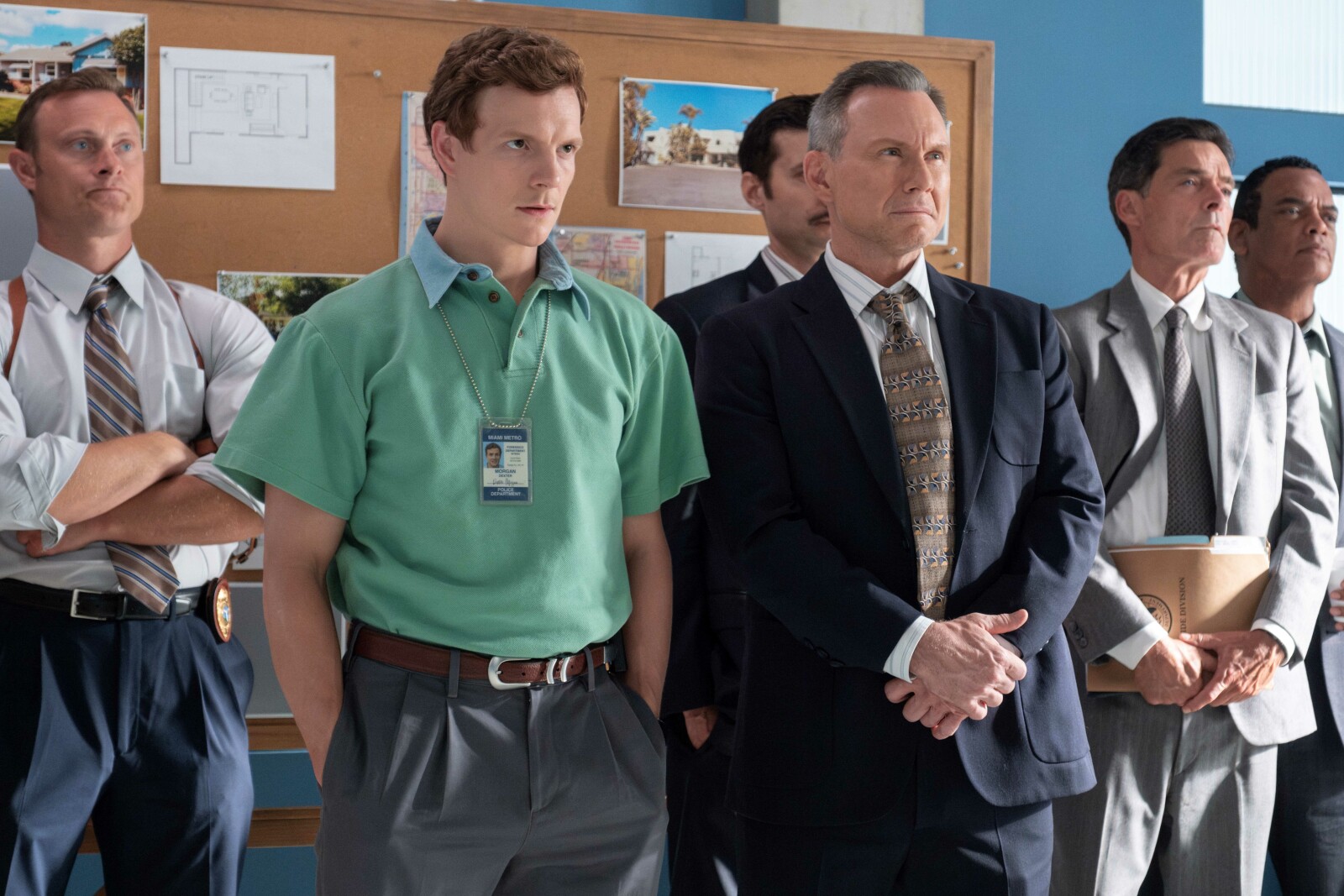
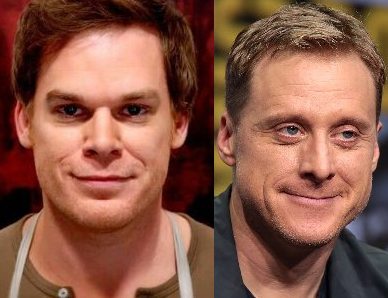
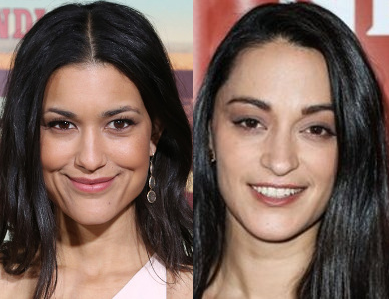


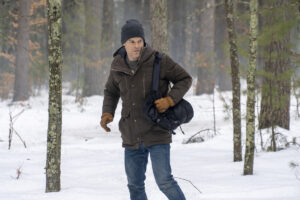

 The next question asked why they brought back Harrison and if that has anything to do with the subtitle “New Blood.” Phillips replied that the theme of the show is “fathers and sons.” He acknowledge that Harrison thought Dexter was dead, so now he has a lot of resentment when he’s found out that he’s alive. “And Dexter has a lot of work to do to win his son back and prove that he’s a good father. And we think we get there.”
The next question asked why they brought back Harrison and if that has anything to do with the subtitle “New Blood.” Phillips replied that the theme of the show is “fathers and sons.” He acknowledge that Harrison thought Dexter was dead, so now he has a lot of resentment when he’s found out that he’s alive. “And Dexter has a lot of work to do to win his son back and prove that he’s a good father. And we think we get there.” Phillips pointed out that Jamie Chung plays a “true—crime murder podcaster who is “introduced in the third episode”” and plays a major role with Julia’s character (Angela) … working her way through all of these crimes that have been committed. So, we are paying attention to it.” He and Hall have discussed this very thing, that the audience has changed, and that there are many young people that will watch now (that were too young to watch before). He also mentioned that the way they deal with murder in European TV as well here has changed. “And we — the audience has changed. And we want to acknowledge all of that in what we’re doing.”
Phillips pointed out that Jamie Chung plays a “true—crime murder podcaster who is “introduced in the third episode”” and plays a major role with Julia’s character (Angela) … working her way through all of these crimes that have been committed. So, we are paying attention to it.” He and Hall have discussed this very thing, that the audience has changed, and that there are many young people that will watch now (that were too young to watch before). He also mentioned that the way they deal with murder in European TV as well here has changed. “And we — the audience has changed. And we want to acknowledge all of that in what we’re doing.” Carpenter answered, ” I sort of, of course, love the concept of the dark passenger. And I feel like, you know, being uninvited inside Dexter’s psyche, I feel like sometimes the dark passenger is the passenger directly behind the wheel, and it was an opportunity not to be an angel or a devil on his shoulder, but to jerk the wheel to the right and the left against Dexter’s will. And to manipulate him, to navigate him, to abuse him, to save him. I feel like it was — it was something entirely different than some sort of ghost entity.”
Carpenter answered, ” I sort of, of course, love the concept of the dark passenger. And I feel like, you know, being uninvited inside Dexter’s psyche, I feel like sometimes the dark passenger is the passenger directly behind the wheel, and it was an opportunity not to be an angel or a devil on his shoulder, but to jerk the wheel to the right and the left against Dexter’s will. And to manipulate him, to navigate him, to abuse him, to save him. I feel like it was — it was something entirely different than some sort of ghost entity.”

